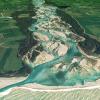Registrations are now open for next year's eResearch NZ 2018 conference from February 12 - 14 in Queenstown.Join us on the shores of Lake Wakatipu for exciting discussions and debates on the 2018 t... Read more
Attribution: NeSI, New Zealand’s research supercomputing organisation, has signed a Platinum Partnership with the Software Carpentry Foundation, a global non-profit organisation that builds commun... Read more
NeSI is pleased to present its Annual Review for 2016. View as a PDF:NeSI-AnnualReview-2016.pdf or view using an online reader below: Read more
Software Carpentry's mission is to help scientists and engineers get more research done in less time and with less pain by teaching them basic lab skills for scientific computing. This hands-on wor... Read more
Winter Bootcamp is a week long training and education event co-ordinated by the Center for eResearch where you can up-skill in a whole host of topics related to digital research practice. Workshops... Read more
Attribution: NeSI, New Zealand’s research supercomputing organisation, today announced a new integrated supercomputing platform to power computational and data intensive research in New Zealand. S... Read more
Issue No. 38May 2017Barbara Chapman Helping Expand OpenMP CommunityCase study: Turning data points into research insightseResearch NZ 2018 | Call for submissionsNeSI VacancieseScience 2017 – 5 Wor... Read more
Attribution: eScience 2017 announces five workshops confirmed for the coming meeting, 24 – 27 October in Auckland, New Zealand. Workshops will be held on the first day, 24 October, followed by thr... Read more







